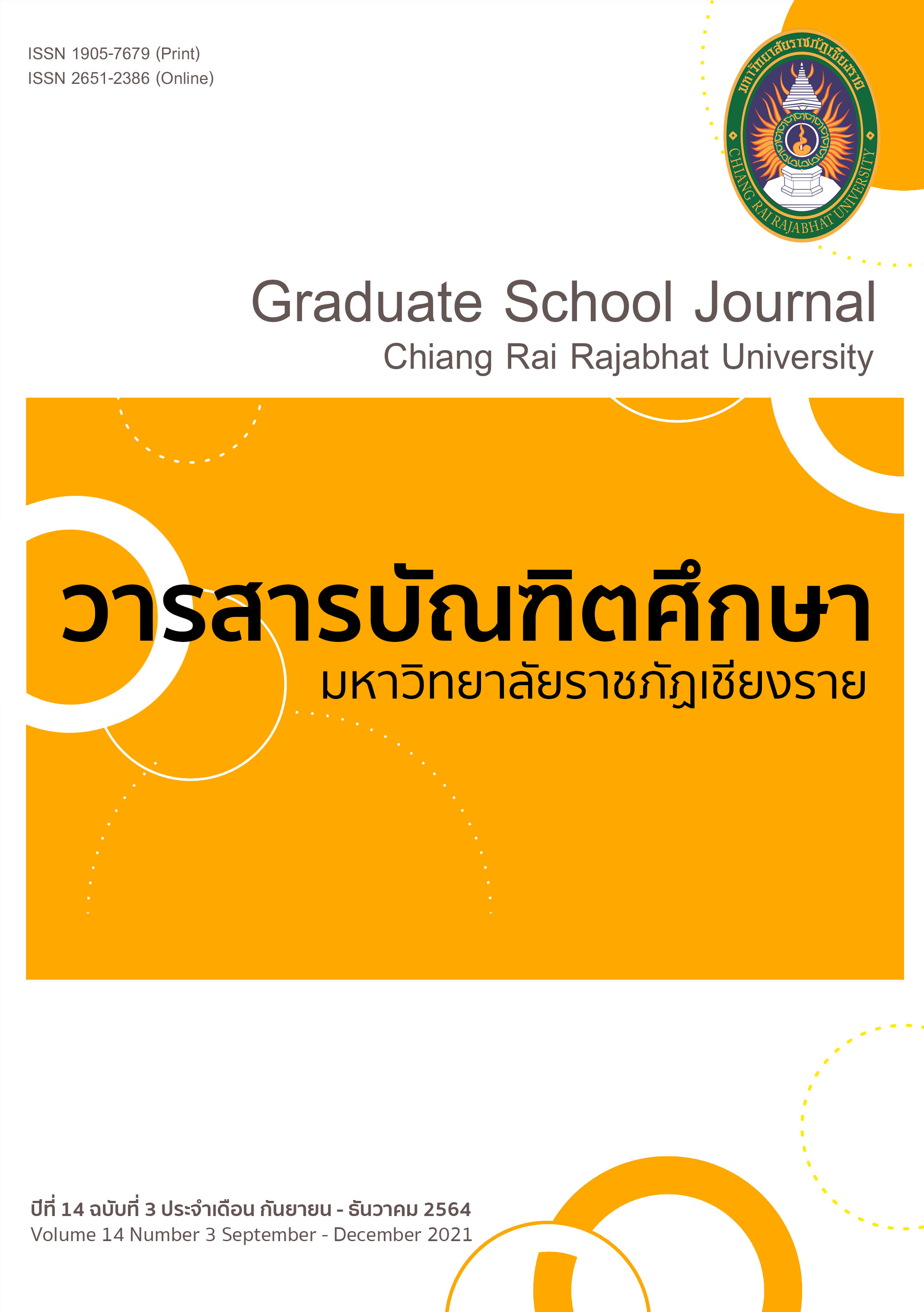รูปแบบการบริหารโรงเรียนอนุบาลประจำจังหวัดโดยใช้นวัตกรรม และเทคโนโลยีสารสนเทศเป็นฐาน
Main Article Content
บทคัดย่อ
การวิจัยครั้งนี้มีวัตถุประสงค์ดังนี้ 1) เพื่อศึกษาองค์ประกอบและแนวทางการบริหารโรงเรียนอนุบาลประจำจังหวัดโดยใช้นวัตกรรมและเทคโนโลยีสารสนเทศเป็นฐาน มีขั้นตอนการวิจัย 2 ขั้นตอน คือ การศึกษาองค์ประกอบโดยการสอบถามกลุ่มตัวอย่าง จำนวน 348 คน และการสัมภาษณ์ผู้อำนวยการ โรงเรียนที่มีวิธีการปฏิบัติที่เป็นเลิศ (Best Practice) จำนวน 5 คน 2) เพื่อสร้างรูปแบบการบริหารโรงเรียนอนุบาลประจำจังหวัดโดยใช้นวัตกรรมและเทคโนโลยีสารสนเทศเป็นฐาน มีขั้นตอนการวิจัย 2 ขั้นตอน คือ การยกร่างรูปแบบและการพิจารณาความเหมาะสมของรูปแบบโดยการสนทนากลุ่มผู้ทรงคุณวุฒิ จำนวน 9 คน และ 3) เพื่อประเมินรูปแบบการบริหารโรงเรียนอนุบาลประจำจังหวัดโดยใช้นวัตกรรมและเทคโนโลยีสารสนเทศเป็นฐาน โดยการสอบถามกลุ่มตัวอย่าง จำนวน 200 คน ผลการวิจัย พบว่า
1. องค์ประกอบและแนวทางการบริหารโรงเรียนอนุบาลประจำจังหวัดโดยใช้นวัตกรรมและเทคโนโลยีสารสนเทศเป็นฐาน มีจำนวน 7 ด้าน ได้แก่ ด้านผู้ส่งมอบนโยบายและผู้สนับสนุนโรงเรียน (Suppliers) ด้านปัจจัยนำเข้า (Input) ด้านกระบวนการ (Process) ด้านผลผลิต (Output) ด้านผลลัพธ์ของโรงเรียน (Outcome) ด้านผู้รับบริการและผู้มีส่วนได้ส่วนเสียของโรงเรียน (Customers & Stakeholders) ด้านผลสะท้อนกลับ (Feedback) และปัจจัยแห่งความสำเร็จในการนำรูปแบบไปใช้ ประกอบด้วย ภาวะผู้นำและการมีส่วนร่วม 2. รูปแบบมีความครอบคลุมอยู่ในระดับมากและความเหมาะสมอยู่ในระดับมากที่สุด 3. รูปแบบมีความเป็นไปได้อยู่ในระดับมาก และความเป็นประโยชน์อยู่ในระดับมากที่สุด
Article Details
บทความที่ได้รับการตีพิมพ์เป็นลิขสิทธิ์ของวารสารมหาวิทยาลัยราชภัฎเชียงราย
ข้อความที่ปรากฏในบทความแต่ละเรื่องในวารสารวิชาการเล่มนี้เป็นความคิดเห็นส่วนตัวของผู้เขียนแต่ละท่านไม่เกี่ยวข้องกับมหาวิทยาลัยราชภัฎเชียงราย และคณาจารย์ท่านอื่นๆในมหาวิทยาลัยฯ แต่อย่างใด ความรับผิดชอบองค์ประกอบทั้งหมดของบทความแต่ละเรื่องเป็นของผู้เขียนแต่ละท่าน หากมีความผิดพลาดใดๆ ผู้เขียนแต่ละท่านจะรับผิดชอบบทความของตนเองแต่ผู้เดียว
เอกสารอ้างอิง
กิตติพร เนาว์สุวรรณ. (2556). การเตรียมความพร้อมการจัดการศึกษาด้วยเทคโนโลยีสารสนเทศในสถานศึกษาเพื่อการเข้าสู่ประชาคมอาเซียน. วารสารมหาวิทยาลัยนราธิวาสราชนครินทร์, 6(2), 156-168
ฐานิตา นพฤทธิ์. (2556). นวัตกรรมการบริหารเทคโนโลยีสารสนเทศและการสื่อสารของโรงเรียนในฝัน. (วิทยานิพนธ์ปรัชญาดุษฎีบัณฑิต). มหาวิทยาลัยศิลปกร. กรุงเทพมหานคร.
เดอะ โนวเลจ. (2560). นิตยสารพัฒนาความรู้และความคิดสร้างสรรค์เพื่อเพิ่มศักยภาพทุนมนุษย์ผ่านกระบวนการเรียนรู้สาธารณะ, 1(6), 3-5.
ถวัลย์ ทองมี. (2555). การพัฒนารูปแบบองค์กรแห่งการเรียนรู้ของโรงเรียนอนุบาลประจำจังหวัด. (วิทยานิพนธ์ปรัชญาดุษฎีบัณฑิต). มหาวิทยาลัยราชภัฏนครปฐม. นครปฐม.
พรรณี ลีกิจวัฒนะ. (2557). วิธีการวิจัยทางการศึกษา. กรุงเทพมหานคร: คณะครุศาสตร์อุตสาหกรรม สถาบันเทคโนโลยีพระจอมเกล้าเจ้าคุณทหารลาดกระบัง.
รักษิต สุทธิพงษ์. (2560). กระบวนทัศน์ใหม่ทางการศึกษากับการพัฒนาครูไทยในยุคดิจิตอล. วารสารศึกษาศาสตร์ มหาวิทยาลัยนเรศวร, 19(2), 344-355.
ราชกิจจานุเบกษา. (2562). นโยบายและแผนระดับชาติว่าด้วยการพัฒนาดิจิทัลเพื่อเศรษฐกิจและสังคม. เล่ม 136 ตอนที่ 47 ก 11 เมษายน 2562, 1-71.
สงบ อินทรมณี. (2562). การบริหารสถานศึกษาในยุคดิจิทัล. วารสารวิชาการมหาวิทยาลัยการจัดการและเทคโนโลยีอีสเทิร์น, 16(1), 353-360.
สมาน อัศวภูมิ. (2551). การบริหารการศึกษาสมัยใหม่ : แนวคิด ทฤษฎี และการปฏิบัติ. (พิมพ์ครั้งที่ 3) อุบลราชธานี: อุบลกิจออฟเซทการพิมพ์.
สันติ บุญภิรมย์. (2557). การวิจัยทางการศึกษาและการวิจัยทางการบริหารการศึกษา : Research in education and research in educational administration. กรุงเทพมหานคร: ทริปเพิ้ล เอ็ดดูเคชั่น.
สำนักงานเขตพื้นที่การศึกษาประถมศึกษาเพชรบูรณ์ เขต 3. (2563). เทคโนโลยีสารสนเทศเกี่ยวกับการ
บริหารการศึกษา : อบรมออนไลน์ผ่านเครือข่ายอินเทอร์เน็ต. สืบค้นเมื่อ 12 เมษายน 2563
จาก https://sites.google.com/a/pbn3.go.th/hlaksutr-xbrm-xxnlin/-hlaksutr-
thekhnoloyi-sahrab-phu-brihar/4-thekhnoloyi-sarsnthes-keiyw-kab-kar-brihar-kar-
suksa
อรอุษา ปุณยบุรณะ. (2558). การบริหารเทคโนโลยีสารสนเทศและการสื่อสารของโรงเรียนสาธิต.
(วิทยานิพนธ์ปรัชญาดุษฎีบัณฑิต). มหาวิทยาลัยศิลปากร. กรุงเทพมหานคร.
Dessler, G. (1999). Essentials of management. Upper Saddle River, NJ: Prentice Halls.
The CIToolkit Content Team. (2019). PDCA Cycle, Retrieved April 24, 2020 from
https://citoolkit.com/articles/pdca-cycle/
The Ministry of Education. (2008). The Basic Education Core Curriculum B.E. 2551 (A.D.
. Bangkok: Kurusapa Ladprao Publishing.


